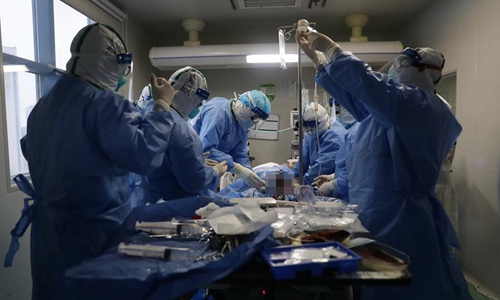More global research, evidence prove Chinese COVID-19 data accurate, virus not from China
By Wang Wenwen, Zhang Han and Huang Lanlan Source:Global Times Published: 2020/5/2 18:41:17

Doctors conduct a surgery on a patient of COVID-19 in critical condition at a hospital in Wuhan, central China's Hubei Province, March 21, 2020. Doctors from Beijing, Jiangsu and other four different provinces have successfully completed the three-hour surgery on a male patient of COVID-19 in critical condition with joint efforts. (Photo by Ke Hao/Xinhua)
A number of recent scientific studies have proved the accuracy of Chinese data regarding the coronavirus outbreak and debunked groundless accusations that the virus originated from China.
A study dated April 28, conducted by Christoffer Koch, a senior research economist at the Federal Research Bank of Dallas and Ken Okamura, a researcher with the University of Oxford's Said Business School, finds no evidence that the Chinese, “massaged their COVID-10 statistics.”
Titled “Benford's Law and COVID-19 Reporting,” the study which used Benford’s Law, a statistical fraud detection technique, found that, “China's distribution of first digits for confirmed cases is in line with Benford's Law...it also matches the distribution found in the United States and Italy.”
The paper pointed out that the ongoing doubts over the credibility of China's data are problematic as, "it impacts subsequent policy choices by countries that saw epidemics later."
Another article, Population flow drives spatio-temporal distribution of COVID-19 in China, was published by Nature on April 29 and signed by a number of experts from China (Changsha, Chengdu, Shenzhen and Hong Kong), Sweden, and the US.
Nicholas A. Christakis from the Yale Institute for Network Science, Yale University, one of the co-authors, wrote on his Twitter account that this paper addressed the accuracy of Chinese COVID-19 case data based on the distribution of population outflows from Wuhan.
Meanwhile, France’s Pasteur Institute released a genetic study on April 26 which shows that the spread of the coronavirus in the country has no link with imported cases from China.
Researchers sequenced samples from 97 French and three Algerian coronavirus patients collected between January 24 and March 24. They confirmed that the first cases in January in France were directly linked to the cases from Hubei, but the later outbreak in many French regions has no link to the cases in January.
The viruses in China and France are from the same ancestor, but they are in two different clades, according to the paper.
"We can infer that the virus was silently circulating in France in February" prior to the wave of COVID-19 cases in the country, the virologists said in the paper.
In addition, published data from Canada's four provinces that have seen the majority of Canada’s COVID-19 cases showed that US travelers, not Chinese, first brought the virus to their shores, Canadian newspaper National Post reported.
These scientific reports and data make sense to people who respect the fact and hold an objective view, said Ni Feng, director of the Institute of American Studies of the Chinese Academy of Social Sciences.
“Nonetheless, for those with inherent prejudices against China, or those who intend to exploit the pandemic to groundlessly slander China with biased mindsets, the reports can hardly stop their self-deceiving defamations,” Ni told the Global Times Saturday.
Since the coronavirus started to sweep across the world, conspiracy theories and accusations against China have gone rampant. Despite the World Health Organization announced that the coronavirus is “natural in origin” and proved China’s transparency in coronavirus data, politicians from a number of countries have relentlessly called for investigations into the source of the virus and passed the buck onto China without solid evidence, which China has strongly rejected.
Virus not manmade at lab
Among those fanning the flames were the US president and officials in his administration who kept using the term “Chinese virus” to stir up racial hatred and smear China. President Donald Trump said on April 30, without giving any evidence, that he has reason to believe the coronavirus outbreak originated from a Wuhan lab, despite scientific reports and the US national intelligence director’s office’s report that COVID-19 was “not manmade or genetically modified.”
Distancing himself from Trump's claims, Australian Prime Minister Scott Morrison also said on Friday that he had no evidence to suggest the disease originated in a Wuhan lab.
Li Haidong, a professor at the Institute of International Relations of the China Foreign Affairs University, said Trump’s strategy in dealing with the pandemic has in many ways to do with US politics: it is politics-centered, not science-centered for the 2020 presidential re-election contender.
“This determines he will ignore or distort what the scientific community said and keep passing the buck, and his focus of attention now is simply the elections,” Li told the Global Times Saturday.
The already strained China-US ties have been further dented by the ongoing coronavirus crisis. While hawkish voices in the US have brought bilateral competition to the highest level, rational voices in both countries are calling for cooperation.
The New York Times published an open letter on May 1, in which more than 70 scholars from China and the US urge leaders in the US and China to put divergences aside and coordinate their responses to COVID-19.
"There is no place today for politicians to endanger bilateral ties by spreading conspiracies or insulting language about virological origins," it said.
Posted in: SOCIETY